General
Rt. Hon. Mbabazi launches Students Centre Project at Mak@90 Grand Finale
Published
13 years agoon
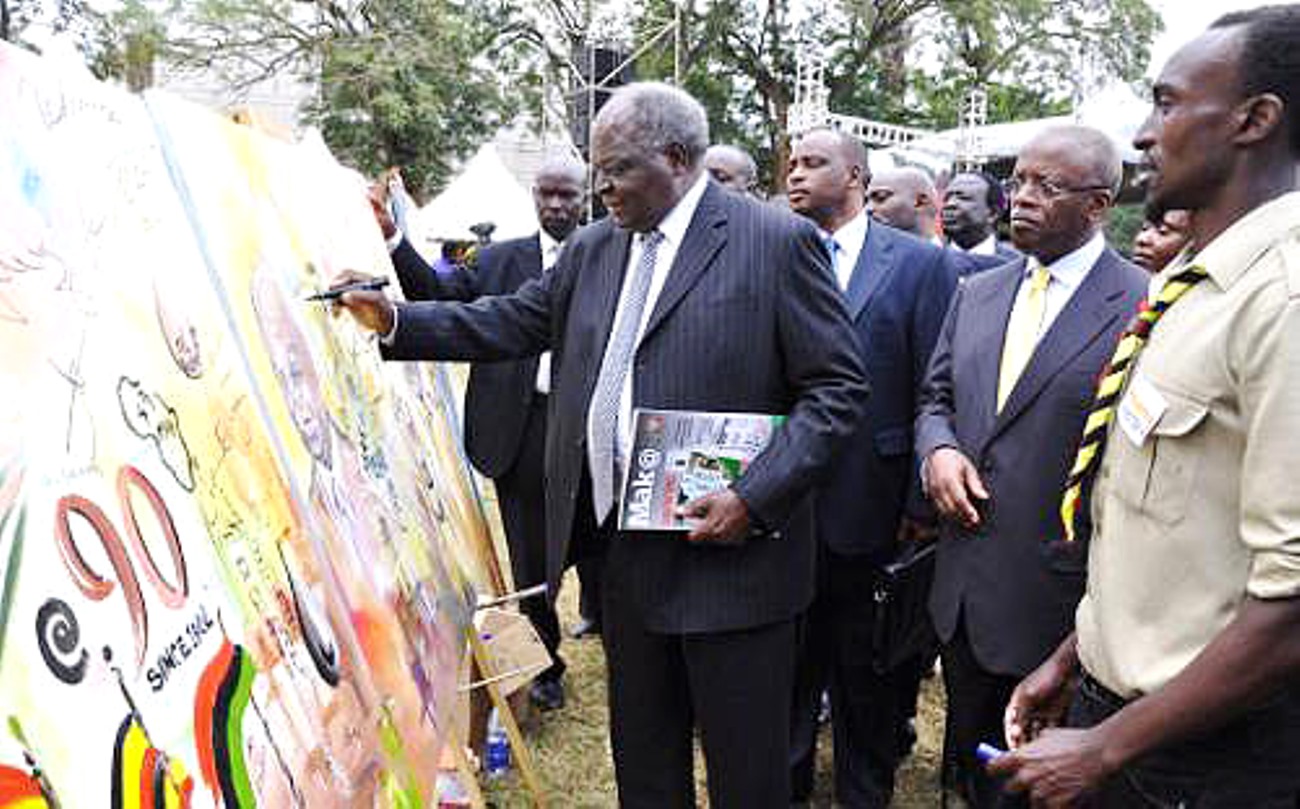
On Saturday 3rd August 2013, distinguished guests, alumni, partners, staff, students, friends and well-wishers filled the Makerere University campus to participate in the ‘Mak@90’ Grand Finale; a climax of the year-long celebrations to mark 90 years of Makerere University’s existence. Thanks to the heavens for the fine and cool weather!
As early as 9:00am, one would feel the celebratory mood in the atmosphere, as flags flew high and the proud alumni kept streaming in. A green and clean campus, people of all ages walking majestically to the Freedom Square; the Uganda Police band playing wonderful hymns; students wearing red gowns; and all invited guests elegantly and confidently walking in, with happy faces – clearly communicating that they have an inner untold joy to be at Makerere University!
By 10:30am, the Freedom Square was filled to capacity as they waited to receive the Chief Guest, H.E Yoweri Kaguta Museveni. The jubilant congregation welcomed the composer of the Makerere University Anthem, Mr. Grace Wilson Mutekanga Igaga with a standing ovation as he was ushered in the VIP tent in the Freedom Square. The Prime Minister of the Republic of Uganda, Rt. Hon. Amama Mbabazi, an alumnus of Makerere University represented His Excellency, the President of the Republic of Uganda. The congregation also rose to their feet to welcome H.E Dr. Mwai Kibaki, former President of the Republic of Kenya, and a distinguished alumnus of Makerere University, to the historic celebrations.
Under the theme, “Leadership towards Africa’s transformation in the 21st century,” the staff and students exhibited the latest advances in research and innovations at this great institution. The Chancellor of Makerere University, Chairperson of Council, Vice Chancellor, the Prime Minister of Uganda, the Minister of Education and Sports; and other dignitaries toured the exhibition.
On behalf of the President, Rt. Hon. Amama Mbabazi laid a foundation stone for the Makerere University Students’ Centre. This project is expected to cost USD 30million with Phase 1 costing USD 15million, and total built-up area of 58,000sq.metres. The congregation was wowed by the magnificent artistic impression of the proposed storied Students’ centre. An excited member of the congregation blossoming with happiness was overheard exclaiming, “Oh dear Lord, I wish I live to see the completion of this wonderful Students’ Centre!” May the Almighty grant this wish.
“The need for Universities to devote more time to research, innovations and career guidance so as to help our children study courses that are relevant to the needs of society has never been greater than it is currently. We would therefore like to congratulate Makerere University for extending her innovations to economic self sustainability by seeking to construct the multi-facility Students Centre,” he said. He also re-emphasized Government’s commitment to supporting Makerere University.
The Vice Chancellor, Prof. John Ddumba-Ssentamu, explained that the Students’ Centre will be a one-stop information centre for students with a multi-purpose auditorium. He called unto all stakeholders, including the alumni to support this cause.
“The role of Alumni in any Institution cannot be underestimated. You are core to the existence of any University. As you may be aware, most Universities, especially in the North, have mostly succeeded because of the support of their alumni. In times when Government funding for higher education is increasingly not enough, the Alumni have a great opportunity to make a substantial contribution. Makerere University has produced over 300,000 graduates. I would like to thank you, Alumni of Makerere University for your various contributions wherever you are in Uganda and all over the globe. I am now appealing to you – the Alumni – to come forward and make your contribution towards this great Institution,” he appealed. The VC also paid tribute to the development partners for supporting the institutional programmes of Makerere University. Professor Ddumba-Ssentamu, also the Chairperson of Mak@90 Main Organising Committee applauded the Members of Mak@90 Organising Committee, University of East Africa celebrations Committee and the Ceremonies Committee for the hard work and selfless service during the year-long Mak@90 celebrations.
H.E Mwai Kibaki, former President of Kenya who spoke as a distinguished alumni of Makerere University, challenged young Makerereans to make their contribution by breaking new ground in research.
“As old Makerereans, we have done our part. It is now the turn of young Makerereans to break new ground through research and innovations,” he emphasized.
Drawing examples of some of the prominent alumni that have gone through Makerere University like the late Julius Nyerere, President Kabila of DRC; President Kibaki congratulated Makerere University for giving the region and the entire world high quality human resource.
“I am grateful to be a witness to the ninety year celebrations. It is not the number of years that count but rather the institution’s illustrious story of transformation,” he added. President Kibaki, a proud alumnus of Makerere University was grateful to the Institution for contributing to making him what he is today.
The celebrations were heightened with the fresh news of Makerere University’s improved ranking from 9th to 4th position on the continent, as per the July 2013 webometric rankings.
“In the next few years, Makerere should become a World Class University. The Task Force on Job Evaluation and Re-organisation of Staff Structure of Makerere University has already made path finder recommendations that are being scrutinized and we shall soon be able to set Makerere on the path to World Class categorization and this is a sure possibility,” re-assured Hon. Jessica Alupo, the Education Minister.
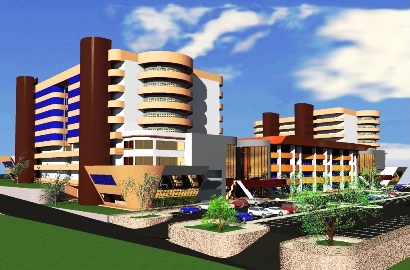
On behalf of the Student community, the Guild President, H.E Anna Adeke-Ebaju, appealed to the Government of Uganda to increase funding to public universities. She requested Government to re-consider the beneficiaries of the Students’ Loan Scheme, which currently caters for only science students, and excludes humanities and social sciences. In response to her request, the Rt. Hon. Prime Minister explained that the Students loan is still in its infancy, Government is aware of its challenges, but that it will improve as time goes by.
A key highlight of the celebrations was the recognition of Mr. Grace Wilson Mutekanga Igaga, the composer of the Makerere University Anthem. The police band played and the congregation joined in giving this illustrious alumnus a highly deserved standing ovation as he walked to receive an award from the Chancellor, Professor George Mondo Kagonyera, in recognition of his genius contribution to Makerere University.
“As we celebrate the 90 years of Makerere University, I take this singular honour of recognizing the composer of one of the most beautiful anthems, I have ever listened to,” remarked the joyful Chancellor. He then presented the well-worded and beautiful plaque to Mr. Grace Wilson Mutekanga Igaga and a dummy cheque of Five Million shillings, as a token of appreciation from the Makerere University.
Mr. Grace Wilson Mutekanga Igaga, in recognition of your ingenious efforts in composing the Makerere University Anthem – a timeless and eternally inspiring masterpiece – read part of the plaque.
The 70 year old Grace Wilson Mutekanga Igaga thrilled the congregation when he melodiously and articulately opened his vocal cords to sing a stanza of the coveted Anthem; in a manner that only the original composer could have done. He was extremely natural, original and fully in control, as the audience looked on in awe, fighting back tears of joy! Mutekanga was in the company of his dear wife, Mrs. Frances Mutekanga. The applause that followed was thunderous!
In his address to the congregation, the jovial alumnus, Mutekanga said, “With big humility, I stand before you, to thank you Mr. Vice Chancellor and your administration for every effort. I thank the Makerere University community for accepting my commodity. I say to the entire world, I feel honoured. I have never imagined that I would receive this honour when I am still alive. I am very grateful for the Award.”
In the same spirit, Gen. Elly Tumwine, the Patron of the Great Lakes Students’ Union presented a medal to H.E Dr. Mwai Kibaki in recognition of his outstanding political, economic and life achievements and also for promoting good governance in the region.
The guests were treated to a photographic memory lane of Makerere University and a video tour of the great Institution. They were served mouth-watering snacks and bull-roasting. The celebration attracted artists who are also alumni of Makerere University. Key among them was Herbert Segujja, a popular comedian, excellent at mimicking President Museveni. The audience broke into uncontrollable laughter when the comedy version of President Museveni in the person of Segujja, drove into the Freedom Square with full V.I.P escorts and glamour. He went ahead to give remarks that sent the audience into further laughter. By press time, (10:00pm) the guests were still dancing to the tunes of these artists, in a highly interactive dance floor. The event was updated online (facebook and twitter) as it happened, and was also covered live on UBC. As estimated 900 guests attended the grand finale, close to the expected 1,000.
The event was majorly sponsored by Makerere University. Other sponsors included Bank of Uganda, Centenary Bank; Stanbic Bank; dfcu Bank, Crane Bank; Coca-Cola Sabco, Crown Beverages Limited, UBC Television, NTV, sms one and the Daily Monitor.
Congratulations to Makerere University for successfully celebrating the 90 years of existence.
Looking forward to the Centennial celebrations!
Story By Ritah Namisango and Marion Alina
Photos by Elias Tuhereze and Joseph Buwule
You may like
-


Meet Najjuka Whitney, The Girl Who Missed Law and Found Her Voice
-


Makerere University School of Public Health Graduates First Cohort of Cost-Effectiveness Analysis Short Course
-


Climate variability found to shape malaria trends in Yumbe District
-


Mak hosts First African Symposium on Natural Capital Accounting and Climate-Sensitive Macroeconomic Modelling
-


Uganda Martyrs Namugongo Students Turn Organic Waste into Soap in an Innovative School Project on Sustainable Waste Management
-


Olivia Nakisita and the Quiet Urgency of Adolescent Refugee Health
General
Mak Selected to Host Alliance for African Partnership Africa Office
Published
10 hours agoon
February 23, 2026
Makerere University has been selected to host the Africa Office of the Alliance for African Partnership (AAP). The significant milestone that underscores Makerere’s role in fostering research, innovation, and global collaborations across the continent was announced at a meeting of the University’s Central Management with an AAP delegation on 23rd February 2026.
Makerere’s selection was based on the University’s robust commitment, alignment with the AAP’s Strategic Plan, and proven ability to manage consortium activities. The AAP, which was initiated by Michigan State University (MSU) in collaboration with Ten African Universities and agricultural policy research networks in 2016, targets critical challenges in education, youth empowerment, health and nutrition, agri-food systems, science and technology, water, energy, environment, and culture and society.
Addressing the delegation consisting of AAP Co-Directors from MSU, Dr. Jose Jackson-Malete and Dr. Amy Jamison, accompanied by newly-appointed Director of the AAP Africa Office, Dr. Racheal Ddungu Mugabi and Ms. Clare Cheromoi, the Vice Chancellor, Prof. Barnabas Nawangwe who appreciated the choice of Makerere to host the Africa Office said:
“One of the greatest challenges facing African universities is PhD training, particularly supervisory capacity. Through partnerships such as the Alliance for African Partnership we can leverage international expertise to strengthen supervision—whether through training supervisors or through joint supervision arrangements.”
Prof. Nawangwe equally applauded joint initiatives such as the Grant Writing and Publication project, which gave rise to the establishment of a Writing Centre that he said can be used to build capacity in AAP member universities with Makerere as the hub. Officially launched on 21st March 2023, the project is living up to its expectation of becoming a springboard for strong postdoctoral collaborative research for both institutions and other US universities.
Dr. Titus Awokuse, Vice Provost and Dean for International Studies and Programs at Michigan State University (MSU) who attended virtually, reiterated that Makerere’s selection reflects its long-standing commitment to advancing African higher education, research excellence, and meaningful global collaboration.
Reflecting on the origins of the Alliance for African Partnerships (AAP), Dr. Awokuse explained that nearly a decade ago, MSU initiated a transformative conversation in Atlanta centered on the question: How should we partner differently? From this dialogue emerged AAP—an Africa-centered consortium that now brings together 12 institutions across Africa and the United States.

He emphasized that AAP is grounded in equity, mutual benefit, shared leadership, and deep respect for African priorities and expertise. Since its founding, MSU has served as convener and key supporter, working with member institutions to strengthen research collaboration, promote faculty and student engagement, and address shared development priorities.
Dr. Awokuse underscored that AAP’s success is the result of collective vision and commitment, not the efforts of a single institution. He paid tribute to Lilongwe University of Agriculture and Natural Resources for hosting the Africa Office in its early years and acknowledged the foundational leadership of the inaugural Africa Office Director.
He described the launch of the Africa Office at Makerere University as a significant milestone that reinforces Africa-led leadership, strengthens regional collaboration, and enhances responsiveness to emerging opportunities. MSU, he affirmed, remains fully committed to AAP and to working closely with Makerere and all consortium partners to expand collaborative research, nurture the next generation of scholars, and advance Africa-led solutions to global challenges.
The newly-appointed AAP Africa Office Director, Dr. Racheal Ddungu Mugabi is a member of faculty in the Department of Development Studies, Institute of Gender and Development Studies. Her work on intersectional inequalities in Uganda and other Global South regions uniquely positions her to drive collaborative research and partnerships at the Africa Office.
Initially founded by ten African Universities and MSU, AAP now comprises eleven African members including; the African Network of Agricultural Policy Institutes (ANAPRI)-Zambia, Egerton University-Kenya, Lilongwe University of Agriculture and Natural Resources (LUANAR)-Malawi, Makerere University-Uganda, United States International University-Africa-Kenya, Universite Cheikh Anta Diop-Senegal, Universite Yambo Ouologuem de Bamako-Mali, University of Botswana-Botswana, University of Dar es Salaam-Tanzania, University of Nigeria, Nsukka-Nigeria, and the latest, University of Pretoria-South Africa.
These Universites collaborate under Focal Points to advance policy-relevant research and sustainable development. Makerere University’s Focal Point is Prof. Robert Wamala, Director of Research, Innovations and Partnerships (DRIP).
Addressing the University Management, Dr. Jackson-Malete outlined the African Futures Research Leadership Program, which nurtures early career scholars through mentorship and skill-building as one of AAP’s flagship programs. She noted that the Program that prioritizes female participants or men committed to promoting women in higher education has for the first time during its fifth cohort admitted the first male, Dr. Alfadaniels Mabingo from the Department of Performing Arts and Film, Makerere University.
The AAP Africa Office at Makerere will coordinate activities, boost research collaboration, mobilize resources, and enhance global engagements for socio-economic transformation. This aligns with Makerere‘s broader goals of leveraging international expertise to build resilient institutions.
View more photos from the event: https://flic.kr/s/aHBqjCLjoA
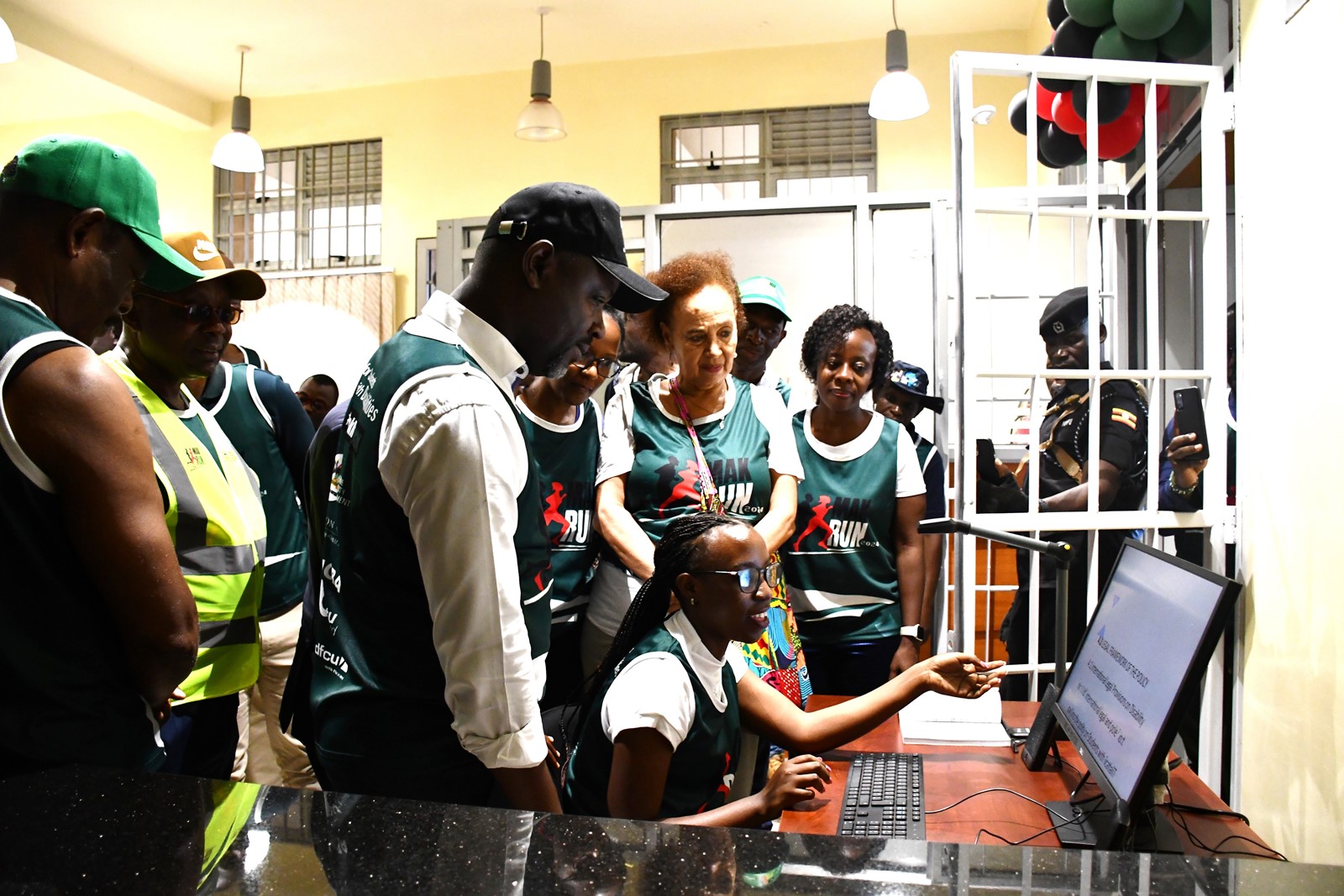
Students with disabilities at Makerere University have been requested to stop seeking for special attention and instead look for solutions and opportunities for personal growth.
This was during a mental wellness, inclusion and safeguarding session organized by the Dean of Students office and the Mastercard Foundation Scholars Program at Makerere University.
Addressing students on mental health and disability inclusion, Mr. Marvin Ggaliwango, a lecturer at the College of Computing and Information Sciences (CoCIS), noted that if the students stop complaining, they will become empowered to take charge of their own development, build resilience and engage confidently in both academic and social environments.
“Turn your lived experiences into tools for innovation. Stop complaining and start creating solutions for yourselves. You are the one living this life, and that gives you the authority to be an expert. When you develop a solution, it doesn’t just benefit you, it helps others too, by removing barriers,” Mr. Marvin Ggaliwango, said.
He encouraged students to see themselves not as victims of circumstance, but as active participants and co-creators of the inclusive environment they wish to experience.
“Learn how to communicate effectively and humbly. If you have a problem, express yourself clearly. Do not isolate yourself or feel resentful. You are not defined by disability, you may face disadvantages, but you still have ability,” he encouraged.
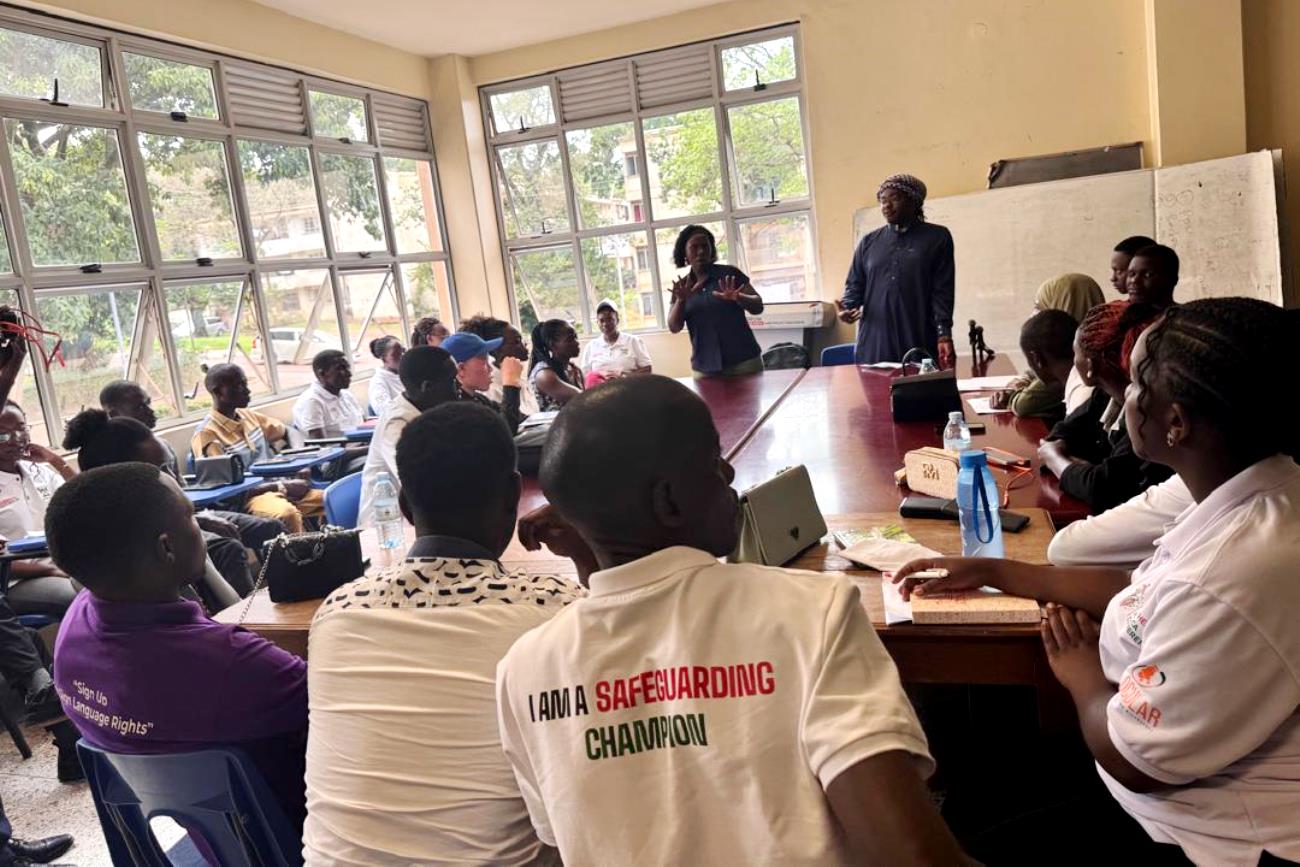
Throughout the session, students listened attentively as he emphasized the importance of self-awareness and personal responsibility, urging them to understand their strengths, acknowledge their limitations and take deliberate steps toward personal growth while contributing positively to the University community.
“We must enhance and ensure that our mental health is number one. Always choose yourself first. Choose what makes you happy and protect your peace. If you are at peace with yourself, your academics will improve. There is a strong link between mental wellness and academic success,” Mr. Ggaliwango, noted.
In his speech, Mr. Musa Mwambu, the Disability Inclusion Advisor at Light for the World Uganda, called upon the students with disabilities to enhance and ensure that their mental health is prioritized.
“As students living with disabilities, sometimes you over expect, because you have a disability you should be given, listened to and when people do not listen to you, you attribute it to your disability, get it from me, even those without disabilities are not listened too. Things are not happening to you because of your disability it is because of the world we live in. Everything that happens to you can happen to others,” Mr Mwambu, noted.
“Have fun with your life. Make yourself happy and be smart. Present yourself in public confidently wherever you go. The way you carry yourself can improve your mental health and how others perceive you,” Mr. Mwambu said.
He reminded the students that gaining admission to Makerere is itself a milestone.
“There are many people without disabilities who have never stepped at Makerere University. Find something that empowers you and hold on to it. You may have a physical impairment, but if you are brilliant in class, you can lead discussions and inspire others,” he added.

During the session, Dr. Rodney Rugyema, the Acting Principal Warden, welcomed the students back from the long holiday. He assured them that the University is committed to their safety and well-being while on campus.
Dr. Rugyema emphasized that the University has systems in place to protect students, both physically and psychologically and encouraged them to report any concerns promptly.
“When you are at the University, you are not on your own, we are always here for you. For us to engage you on mental wellness and inclusion, we want you to be in the right state of mind, whole and complete,” Dr Rugyema, said.
He added: “We are here to empower you and we are calling upon you not be a risk for yourself and always be able to detect risks that are likely to affect your mental health and works towards avoiding them and reporting them to ensure that the University manages them before they escalate into real harm whose impact is more serious than you can think,”
During the session, Ms. Diane Nabikolo Osiru highlighted the University’s broader commitment to safeguarding.
Safeguarding at Makerere University refers to measures put in place to promote safety and wellness of all students, staffs and other stakeholders.
“At Makerere University, safety is not a luxury for few. but it is a right for every student. As the semesters begins, we are urging you to learn how to identify signs of harm or abuses and report them to the appropriate safeguarding contact points,” Ms Nabikolo, said.
For support in case of any harm or abuse, International and Refugee Students, can access support through the Advancement and International Office, while Students with Disabilities, can utilize the Disability Support Center. Those with personal and emotional challenges, can visit the Counselling and Guidance Centre.
In his speech, Dr Joab Agaba, a Lecturer in the College of Computing and Information Sciences, guided students how to report risks and incidences to the MakSafeSpace, the e-reporting platform complimenting the other University traditional reporting channels.
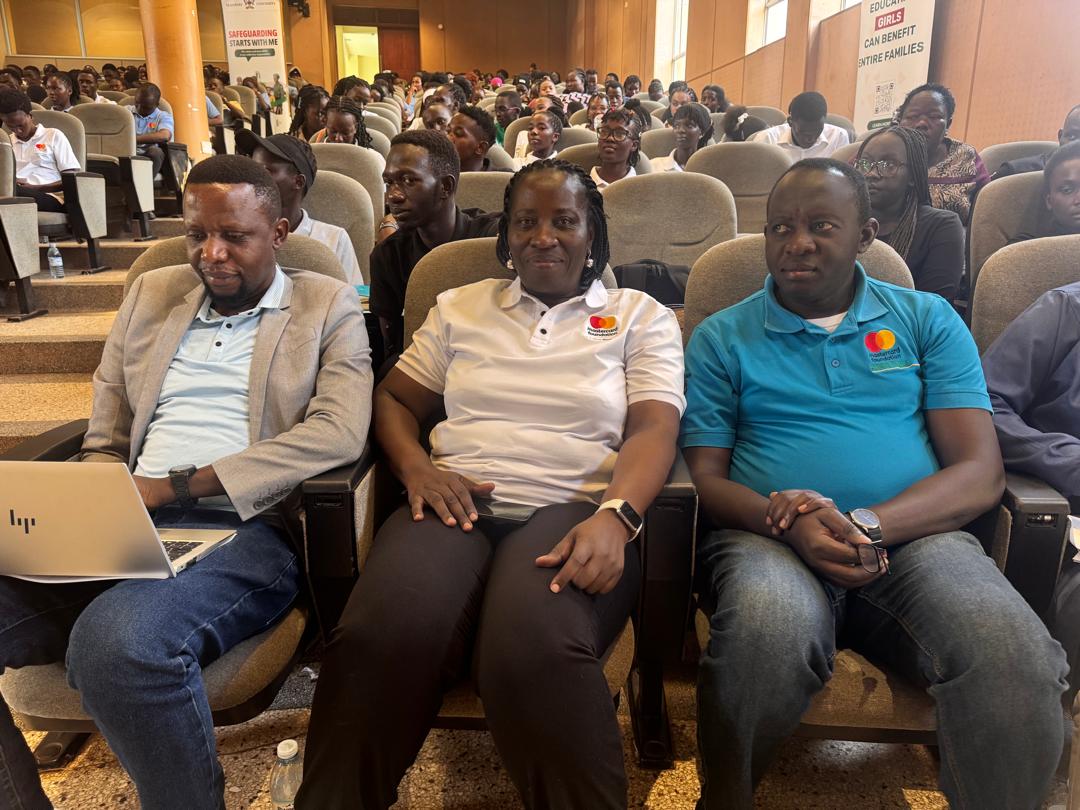
Mr. Henry Nsubuga, the Manager of the Counselling and Guidance Center, shared practical strategies for coping with stress effectively including time management, setting realistic goals, seeking support from peers or counsellors.
Students speak out
Shanitah Nahamya, 2nd year student of the Bachelor of Adult and Community Education
“I have learned how to respectfully and appropriately engage with students with disabilities. In the past, I often felt pity when I encountered them, but now I understand that what they need is not pity, it is respect, support, and equal opportunity.”
Guo Dorothy Geri, 1st year student of the Bachelor of Commerce
“I have learnt how to use inclusive language. Before offering help to a student with a disability, I will first ask them, because not all the time do they need our help. You might think someone wants to be helped to cross the road, yet they are waiting for someone.”
Valentines Doris Aduka, 1st Year student of the Bachelor of Biomedical Science
“I have been calling students with disabilities special names, thinking it was kind. But I have learned that they do not want to be treated differently or labeled in a special way. What they value most is being treated like everyone else, with respect, dignity, and fairness.”
General
Strengthening Global Partnerships to Advance Research, Innovation, and Graduate Training: Makerere University Hosts Delegation from the University of Warwick
Published
5 days agoon
February 19, 2026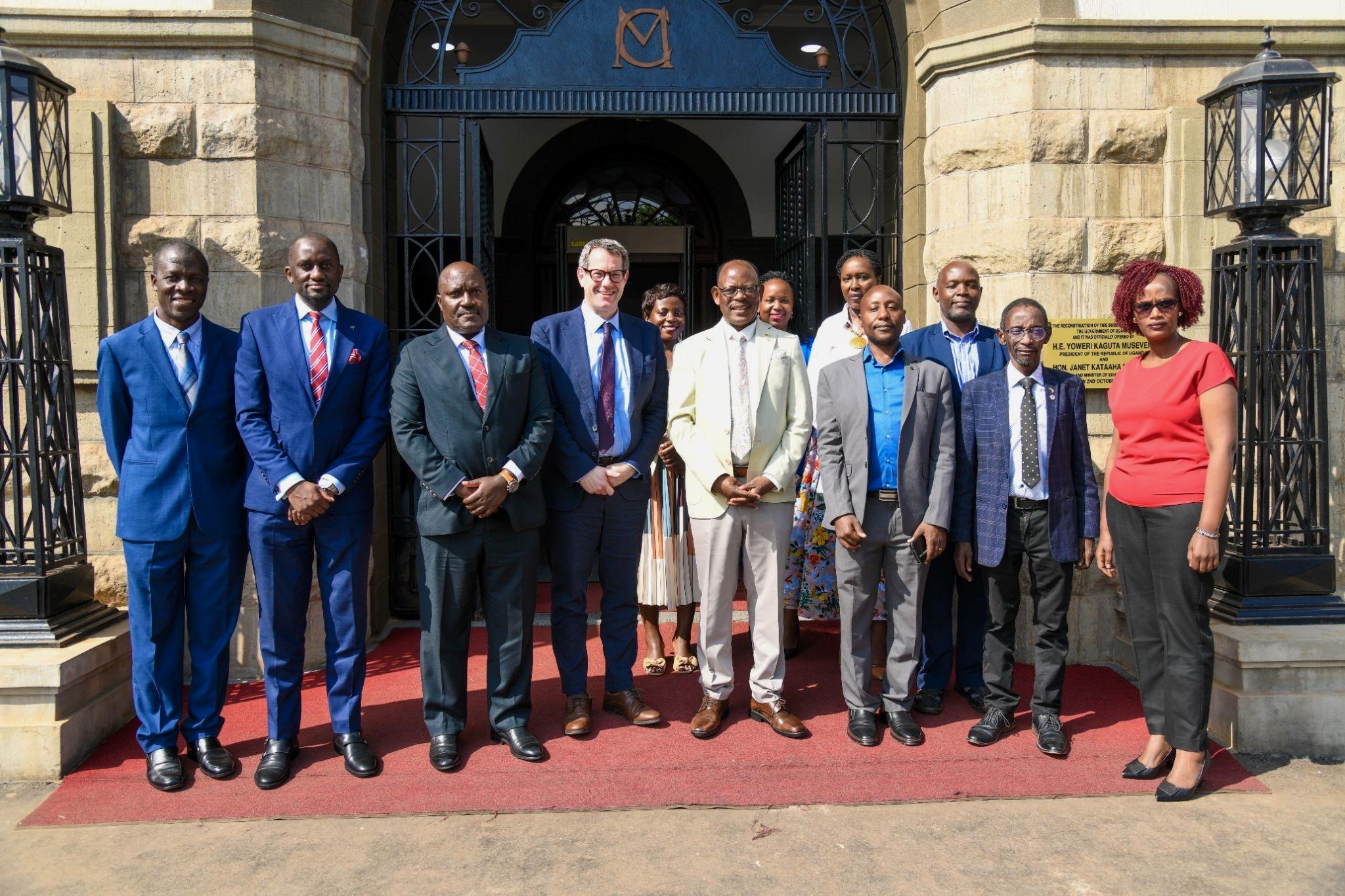
Makerere University continues to deepen its global engagement agenda through strategic partnerships that enhance research, innovation, and graduate training. On Friday, 13th February, 2025, during a recent engagement with a delegation from the University of Warwick (UK), university leaders, researchers, and administrators explored potential collaborations to address pressing development challenges and strengthen institutional capacity.
Expanding Collaboration in Research and Innovation
Welcoming the delegation, Prof. Fred Masagazi-Masaazi, Chairperson of the Makerere University Research and Innovations Fund (Mak-RIF) Grants Management Committee, emphasized the growing dialogue between Makerere University and the University of Warwick. He noted that ongoing discussions are focused on resource mobilization to support research and innovation, as well as building sustainable academic exchanges for both staff and students.
Dr. Roy Mayega, Mak-RIF Coordinator, together with Mrs. Phoebe Lutaaya Kamya, Deputy Coordinator, and members of the Mak-RIF team, highlighted the Fund’s role in catalyzing collaborative research and strengthening partnerships that translate research into societal impact.
Mr. Simon Kizito, Deputy University Secretary, outlined key areas identified for collaboration, including joint research and innovation initiatives, benchmarking visits across disciplines such as law, science, and ICT, and student exchanges designed to strengthen applied research skills. He also pointed to opportunities for training Makerere staff in specialized areas such as tropical diseases and innovation ecosystems, drawing lessons from Warwick’s strong linkages with industry partners located within its campus.
Makerere’s Strategic Priorities and Global Role
In his remarks, the Vice Chancellor underscored the longstanding relationship between Makerere University and the University of Warwick, dating back to the early 1980s, initially through staff training and more recently through collaborative research.
He highlighted Makerere’s historic contribution to leadership development across Africa and beyond, and the University’s continued growth following faculty rebuilding efforts in the 1980s, which have strengthened its research capacity. Today, Makerere has over 1,300 academic staff, more than 1,000 of whom hold PhDs, positioning the institution to play a leading role in knowledge production.
The Vice Chancellor also outlined major thematic areas where partnerships are critical:
- Climate change and food security: Researchers at the College of Agricultural and Environmental Sciences (CAES) are developing drought-resistant and high-yield seed varieties to address changing weather patterns and food insecurity.
- Public health and infectious diseases: Uganda faces frequent outbreaks of diseases such as Ebola and Marburg, and Makerere has built strong capacity in outbreak response and tropical medicine. The University’s medical school and the Infectious Diseases Institute (IDI) continue to play a pivotal role in research and treatment.
- Peace and conflict studies: Through initiatives such as the Rotary Peace Centre, Makerere contributes to training global leaders in conflict resolution.
- Climate-sensitive macroeconomic modelling: Makerere recently hosted a conference in collaboration with the Ministry of Finance, Planning and Economic Development to advocate for climate-responsive macroeconomic modelling and to plan for the establishment of a Centre of Excellence in this field.
- Innovation and technology: The University’s innovation ecosystem has produced notable outputs, including Africa’s first electric vehicle and ongoing work to expand incubation facilities to enable students to graduate with viable enterprises.
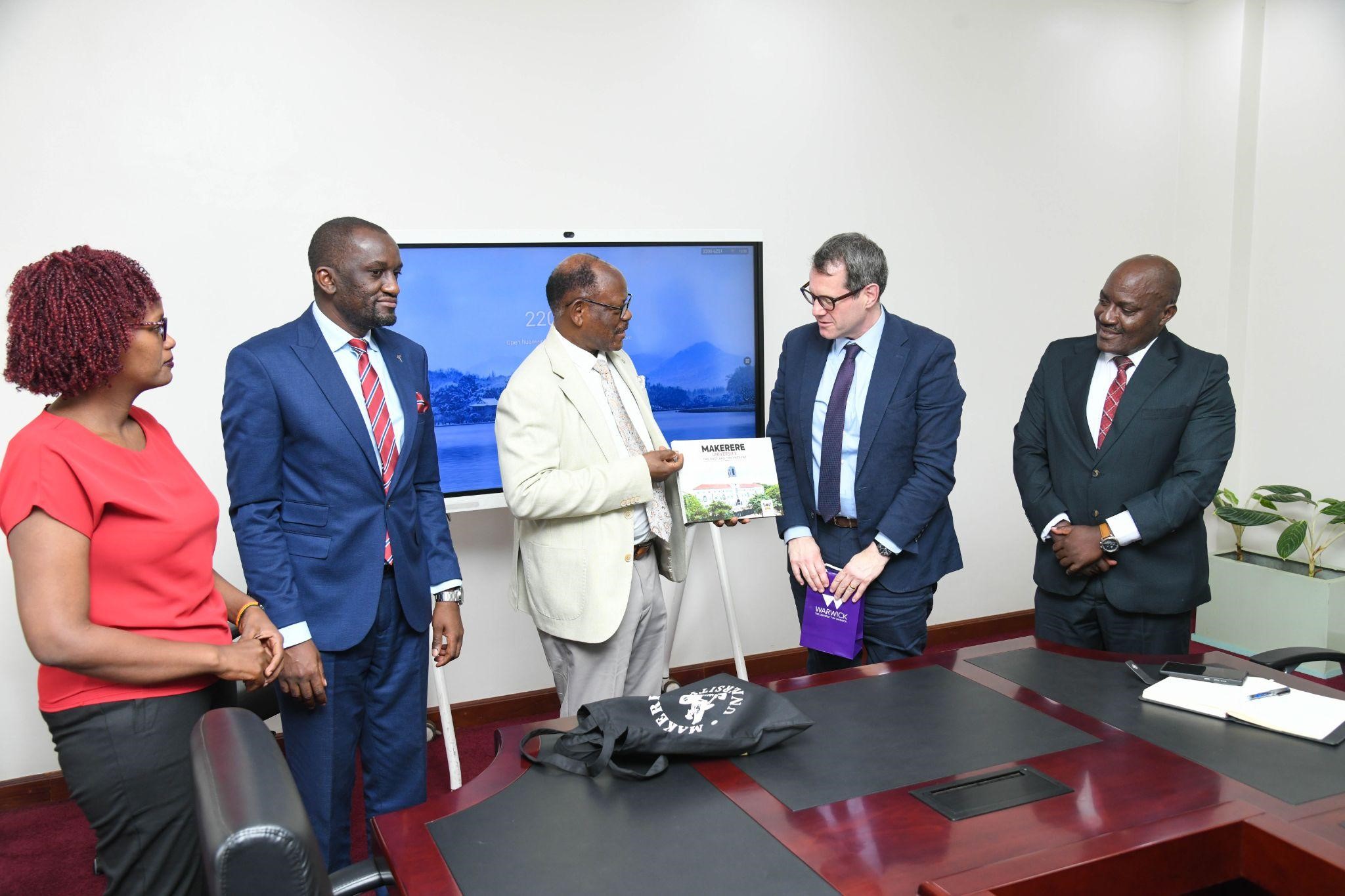
The Vice Chancellor emphasized that addressing youth unemployment remains a central priority, noting that innovation, entrepreneurship, and graduate training are essential to building stable societies.
He further stressed the importance of expanding graduate education. Africa currently produces a small proportion of global research output, and increasing PhD and Master’s training supported by international partnerships remains critical to accelerating knowledge production and development outcomes.
Internationalization and Shared Learning
Speaking on behalf of the University of Warwick, Professor Daniel Branch, Deputy Vice Chancellor, reflected on Warwick’s own institutional journey, noting that its growth has been driven by a strong focus on internationalization, innovation, and research. He expressed Warwick’s commitment to building productive partnerships with African universities, including Makerere, to advance joint research, training, and innovation.
Professor Branch also highlighted the importance of university-industry linkages, citing examples such as collaborations with major manufacturing firms that provide practical training opportunities and inform curriculum development.
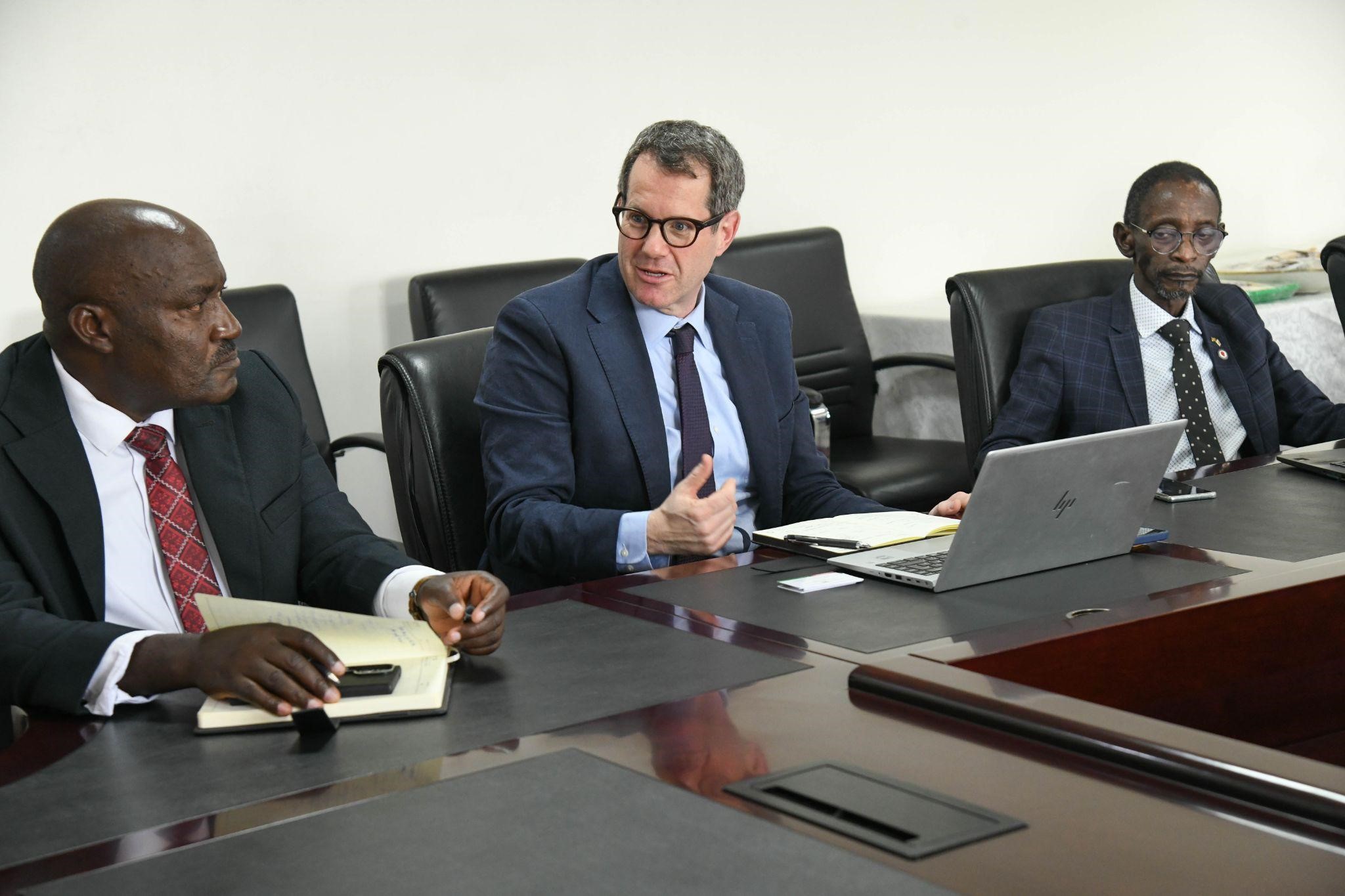
Showcasing Research and Innovation at CEDAT
A second session of the engagement was held at the College of Engineering, Design, Art and Technology (CEDAT), where academic leaders and researchers presented ongoing work across multiple disciplines.
Presentations included:
- Development of a solar water pump through reverse engineering (Dr. Edmund Tumusiime)
- Crane Cloud, a locally developed cloud-computing platform (team from the College of Computing and Information Sciences)
- Profiling gaseous emissions associated with burnt bricks (Dr. Nathan)
- Integration of centralized grid and decentralized renewable off-grid systems: a techno-economic analysis (Dr. Abubaker Waswa)
- Innovation and digitalization pathways for affordable housing in Sub-Saharan Africa (Prof. Stephen Mukiibi)
The session was attended by CEDAT leadership, including the Principal, Prof. Moses Musinguzi, as well as deans and heads of department from engineering, built environment, and industrial and fine arts. The day’s activities were concluded with a tour of Makerere University’s Innovation Hub.
The engagement reaffirmed Makerere University’s commitment to building strong, mutually beneficial partnerships that accelerate research, strengthen graduate training, and drive innovation. As global challenges such as climate change, public health threats, and youth unemployment intensify, collaboration among universities remains essential to developing scalable, evidence-based solutions.
Through partnerships such as the one Makerere University and the University of Warwick hope to activate through a Memorandum of Understanding in the near future, Makerere continues to position itself as a leading research-intensive university dedicated to transforming society through knowledge, innovation, and global cooperation.
Caroline Kainomugisha is the Communications Officer, Advancement Office, Makerere University.
Trending
-

 General2 weeks ago
General2 weeks agoAptitude Exam (Paper 1) Results for the Mature Age Entry Scheme 2026/2027
-

 Health5 days ago
Health5 days agoUganda has until 2030 to end Open Defecation as Ntaro’s PhD Examines Kabale’s Progress
-

 General5 days ago
General5 days agoMastercard Foundation Scholars embrace and honour their rich cultural diversity
-

 General2 weeks ago
General2 weeks agoFor Youth by Youth – Call for Second Cohort Applications
-

 Agriculture & Environment4 days ago
Agriculture & Environment4 days agoUganda Martyrs Namugongo Students Turn Organic Waste into Soap in an Innovative School Project on Sustainable Waste Management
